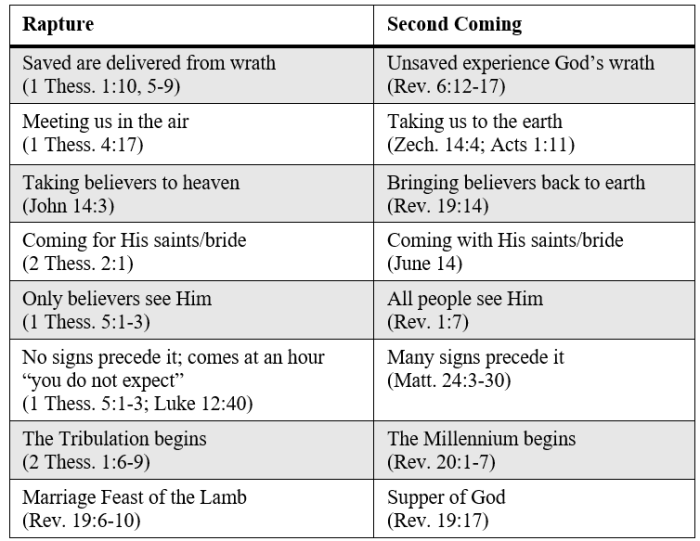The pre-trib rapture believers are alright

I feel a little like Jude.
In his epistle, Jesus’ half-brother says, “while I was making every effort to write you about our common salvation, I felt the necessity to write to you appealing that…” (Jude 3). In saying that, Jude tells us that he began to author one set of thoughts but then was led to change course and craft something totally different.
Like Jude, I started out writing one article for this week, but instead “felt the necessity” to write about something else. It’s all Dr. Michael Brown’s fault.
Dr. Brown recently posted two articles on the rapture of the Church where he argues against the date setting of Christ’s return (spot on!), encourages us to bear fruit and evangelize the lost (kudos!), and contends that God would not remove His people in an instant given the spiritual wreck and ruin our planet currently finds itself in.
Hmmmm. Hang on a minute.
Before I say anything else, let me make it clear that I am a Dr. Michael Brown fan. I have a number of his books, have benefited from his apologetics discourses, and greatly admire him for taking a public stand against our anti-Christian culture, which does its best to smear him.
I’ll also freely admit I could be wrong in my belief of an imminent, pre-tribulation rapture of the Church, which is at odds with his stance. It’s not something I’ll cross swords over with anyone like a core Christian doctrine that impacts salvation.
So, all that said, let me offer a few things for you to consider on why I believe that holding to an any-moment, lost-world-now rapture is rational from a biblical perspective.
Where they’d go?
I think we can agree that the question is not if a rapture will occur, but rather when. The event is named from Paul's use of the Greek term harpagesometha in 1 Thess. 4:17 (“caught up”; see uses elsewhere at Acts 8:39; 2 Cor. 12:2, 4; and Rev. 12:5), which is raptus in Latin. Three explicit passages found in Scripture about the rapture appear in 1 Thess. 4, John 14, and 1 Cor. 15.
In short, we pre-trib rappers (I just now made that term up; feel free to use it elsewhere if you want), see a biblical distinction in purpose between the rapture and second coming of Christ, which can be summarized this way:

An even shorter way to contrast the two events is “for” vs. “with.” The rapture has Christ coming “for” His church whereas, in the second coming, He arrives “with” His church, as the passages above spell out.
Too much left to do?
In both of his articles, Dr. Brown contends that an imminent, pre-trib rapture leaves a desperate world in the lurch, with billions of unsaved people, and “is not in keeping with the character of God or the way He has acted in history. Surely, the idea that, suddenly, without any warning or sign, we are suddenly zapped out of here — in the middle of the symphony, so to say — makes no biblical sense at all.”
Let me offer a couple of points on this particular argument for you to consider.
I would love to tell you that I find biblical support for a postmillennial position where the church blows the doors off the world and transforms it into a place where the majority are saved and applaud the return of our Savior. But it just ain’t so.
Scripture tells us that the future is one that’s on a downward slide spiritually. People proceeding from “bad to worse” (2 Tim. 3:13), life in general is described as “difficult times” (2 Tim. 3:1), apostasy being the soup du jour vs. faith (2 Thess. 2:3), and the narrow gate always seeing “few” who find it (Matt. 7:14).
The Bible also showcases multiple examples of time running out for a particular people. His grace is withdrawn, the lights go out, followed then by the awful wrath of God being delivered.
At some point, the door of the ark slams shut; the chosen of God are ushered out of a depraved city that is afterward immediately destroyed; the “restrainer” is removed allowing Hell on earth to be unleased (2 Thess. 2:6).
In all these cases, the majority receive punishment and wrath whereas a small remnant finds salvation. My point? There’s never going to be a “good” time here on earth for God’s wrath to fall.
Moreover, the Church has flown way past Noah with respect to the amount of time given to preaching and warning people of a coming judgment: the return of Jesus not as a lamb but as a lion. Therefore, no one should be surprised when — in the twinkling of an eye (1 Cor. 15:52) — that starts with God’s people being ushered out of harm’s way before the Lord’s hammer comes down.
I agree wholeheartedly with Dr. Brown that we need to be focused on preaching the Gospel to a lost world and not sitting idle with our bags packed, ready to vacate the premises. But I believe that mindset is made even more strong when the idea of Christ’s imminent return for His people is added to the mix.
Watching the world devolve around him, an old farmer told his pastor, “I’ve stopped looking for the undertaker and have started looking for the upper-taker.” Given what Scripture tells us, I’m with him, and that fact makes me more active as a Christian than I might otherwise be if I was waiting for all of Jesus’ Olivet Discourse and the book of Revelation to play out before He comes back.
You can certainly disagree, but when the pre-trib rapture does happen, I’ll find you to say I told you so. I’m like that.
Robin Schumacher is an accomplished software executive and Christian apologist who has written many articles, authored and contributed to several Christian books, appeared on nationally syndicated radio programs, and presented at apologetic events. He holds a BS in Business, Master's in Christian apologetics and a Ph.D. in New Testament. His latest book is, A Confident Faith: Winning people to Christ with the apologetics of the Apostle Paul.




























